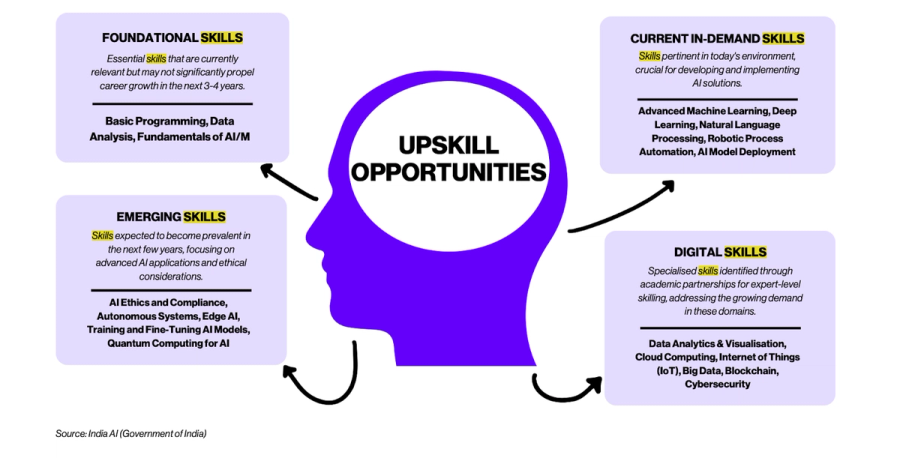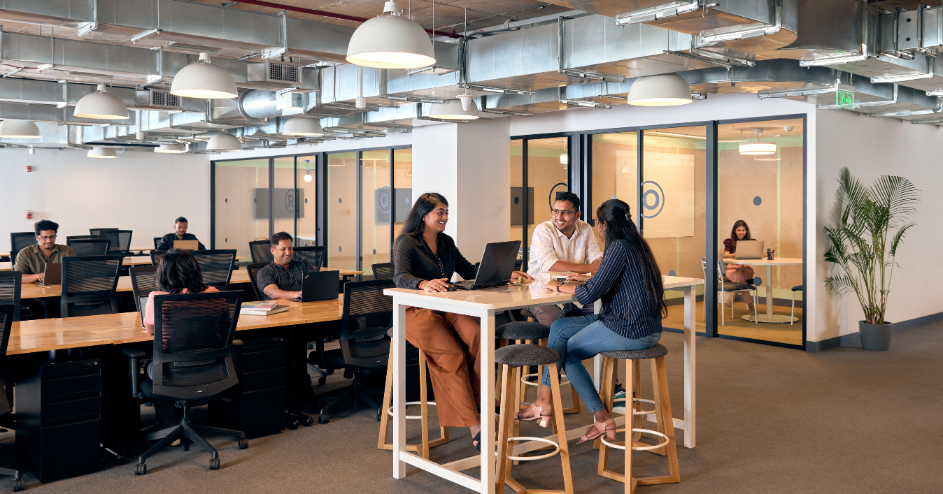WEWORK LABS
What Skills Are Startups Expecting from Employees in India?

Discover the essential employee skills Indian startups want today: AI literacy, customer focus, resilience, and agility. Learn how to build a future-ready workforce.
Hiring the wrong person can cost a startup more than just money—it can derail momentum.In the fast-paced world of Indian startups, hiring the right talent can make or break your business. Startups need employees who are not just skilled but also adaptable, proactive, and aligned with the company’s vision. But what are the essential employee skills and qualities that startups should prioritize? In this piece we’ll answer how to get your workforce AI ready. That question can get particularly difficult to answer with advent of artificial intelligence. With as many as 70% of Indian startups now looking to include artificial intelligence in their core functions, it's now becoming commonplace to expect employees to be proficient with their understanding of artificial intelligence.
Startups operate in an environment where ideas and concepts need to be iterated fast and in an efficient manner. Particularly in the early stages of their journey, startups might not even have set processes in place and would require someone with a very agile mindset. Many startups are now relying on artificial intelligence to drive greater agility, by for instance, using it to tailor unique learning patterns based on how an individual is performing in their workplace.
In the North Star Annual Report we released this year, we highlight the growing need for upskilling among India’s startup workforce. In it we highlight how the “future of work” will hinge on how effectively its workforce is upskilled to work alongside AI. Encouragingly, the country already has a strong foundation—with a vast pool of STEM graduates and a leading position in global outsourcing—making it well-placed to harness AI-era opportunities.
You can read more in depth about that point by downloading your own copy of the report, here.
But in this piece we’ll double down on what essential qualities and skills that a startup would need to capture to be future-ready in the Indian startup ecosystem.
Technical Proficiency & AI Literacy
As AI becomes integral to business operations, employees must possess a baseline understanding of how AI tools function. This doesn’t mean everyone needs to be a data scientist, but basic AI literacy—knowing how to use AI-driven analytics, automation tools, and machine learning applications—is becoming a necessity.
For example:
- Product teams should understand how AI can enhance user experience.
- Marketing professionals must leverage AI for customer segmentation and predictive analytics.
- Operations teams can use AI for supply chain optimization.
Startups should invest in continuous learning programs to keep their workforce updated on AI advancements. The work towards enhancing artificial intelligence literacy is being put in already—like, for instance, the Indian government launched India AI with the sole purpose of creating a more AI-literate workforce. A report by McKinsey also highlights how by harnessing agility early both in the talent sense and as a company, it can have a powerful impact on the bottom line. Therefore, agile companies, which are built on the foundation of its agile workforce as an essential employee skill and quality are in a better place to respond to market shifts quickly. Here’s a quick snapshot of the skill gap from the North Star Annual Report that illustrates this point further.

Source: The North Star Annual Report
Developing a critical customer-centric mindset
India is well on track to become the second largest consumer market in the world. According to a Edelweiss Mutual Fund Report, it will hold onto that position by that mark due to a multitude of factors like rising incomes, a young workforce, and rapid urbanization, which are expected to drive consumer growth significantly. With India gearing up to establish its consumer market, startups will need employees that think critically, but also have a deep customer-centric mindset. A customer-centric mindset means putting the needs, feedback, and experiences of customers at the core of every decision. For startups, which are often in the process of finding or refining product-market fit, this mindset is not just a value—it's a survival strategy.
Also Read: Global startup ecosystem
Unlike established companies that may have long-standing customer bases and brand loyalty, startups must earn trust from scratch. This requires every team member, regardless of their role, to care deeply about the customer journey—from the first touchpoint to ongoing support. Startups that truly listen to their users are able to iterate faster, fix pain points earlier, and create more relevant and differentiated solutions.
Some key behaviors that reflect a strong customer-centric mindset include:
- Empathy for user needs and pain points
- Proactive listening and feedback gathering
- Responsiveness and accountability
Developing resilience
Resilience is almost a non-negotiable when you’re working in a startup. Particularly in a country like India where ease of doing business norms are stringent, regulatory environments are choppy and the undercurrents of running your business can seem strife it is important to develop deep resilience to shifting goalposts and also to things like economic uncertainty or global politics which can have a direct impact on your business.
Resilience training can be of two types, one which focuses on creating a space to grow emotional resilience and the other for external resilience. Some startups offer resilience training courses which can help employees learn these essential skills and qualities at their own pace. On a startup level, Indian startups have increasingly shown greater resilience to external pressures. For instance, late stage startups showed greater resilience last year compared to other global economies like the US and UK, as compared to early stages in these economies. You can read a little bit more about these factors in the North Star Annual Report, by downloading a copy of your report here.
The WeWork Labs Take
While product innovation and funding are critical, it’s the people who build, adapt, and push through challenges that truly define a startup’s trajectory. Startups don’t just hire for experience; they hire for mindset. The Indian startup ecosystem is at an inflection point. AI is reshaping industries, and the workforce must evolve accordingly. While technical skills are important, soft skills, adaptability, and problem-solving will differentiate top talent. Startups that prioritize these qualities will attract and retain employees who drive sustainable growth.
Related Blogs:

WEWORK LABS
With the Indian startup ecosystem gaining maturity, there are a number of things changing—startups are thinking more global in their ambitions, more companies are taking their companies to the market

WEWORK LABS
India may be home to unicorns and cutting-edge tech, but at its core, it's still a nation of farmers — with over 50% of the population dependent on agriculture.

